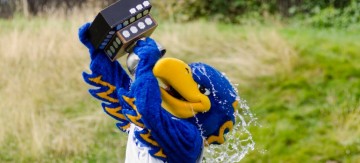If you’ve spent any time perusing social media over the past few weeks, you’ve probably come across dozens of videos of friends, celebrities, and even politicians dousing themselves with ice water. Are people really that desperate to cool down in the last few weeks of summer? Not quite.
The videos are a part of the #IceBucketChallenge – a social media phenomenon breaking all kinds of charity records. The idea was launched by the ALS foundation to raise awareness about Amyotrophic Lateral Sclerosis, a progressive degenerative disease that affects nerve cells in the brain and spinal cord. Around 600 Canadians die of ALS every year.
The idea is simple enough: once you are nominated, you have 24 hours to donate to the ALS foundation, or dump ice water on your head – or, as many people have undertaken, do both. Post a video of you completing the challenge, then nominate three of your friends to do the same.
The Ice Bucket Challenge began gaining momentum after Boston College baseball player Peter Frates, who has ALS, posted about the challenge on Twitter. Television anchor Matt Lauer was one of the first celebrities to undergo the icy dare, followed by professional golfer Chris Kennedy. Within days, what began as a hashtag became a worldwide phenomenon, quite literally flooding screens and social media platforms around the world.
Former American President George W. Bush has participated. Shakira challenged Pope Francis, while Leonardo diCaprio nominated Prime Minister Stephen Harper. Other high-profile celebrities who have participated include Mark Zuckerberg, Oprah, Bill Gates, Lady Gaga, and New Jersey governor Chris Christie. Justin Bieber even challenged President Barack Obama, who declined in favor of a donation. The phenomenon became so extensive that the US State Department ruled that all American diplomats, military, and house members were officially banned from taking the challenge.
The trend has also inspired a number of spinoffs. Charlie Sheen dumped a bucket of dollar bills over his head. When nominated by Jimmy Kimmel and Ben Affleck, Matt Damon chose to instead use toilet water to draw attention to the 800 million people in the world who lack access to clean water. Palestinians in the war-torn Gaza Strip have undertaken the “Rubble Bucket Challenge” to raise awareness of their dire humanitarian situation. Unsurprisingly, a slew of Ice Bucket Challenge bloopers have been compiled for your enjoyment. Even UBC President Arvind Gupta has hinted on Twitter that he may be participating.
The speed with which the campaign gained momentum and raised funds has baffled traditional community organizers, who are now asking themselves what factors led to its viral success. The concept is both fun to perform, and entertaining to watch. Smartphones have made videos more shareable than ever. As participation requires only a bucket, ice cubes, and some cold water, barriers to entry are relatively low. The participation of celebrities with massive audiences on social media, partnered with the “nomination” aspect of the challenge, meant that the spread was exponential, reaching more and more people as more videos were posted. At the moment of writing, over 1000 celebrities have participated, over 653 000 individual ice bucket challenge videos have been uploaded to YouTube, and a mind-boggling 1.2 million videos have been shared on Facebook. The ALS Association announced that it has raised over $94.3 million since the campaign was launched on July 29th, compared to the $2.5 million raised during last year’s campaign.
Like any successful social media phenomenon, the Ice Bucket Challenge has its critics. Many are questioning whether the intentions of the campaign are truly altruistic, or simply another narcissistically self-promoting form of slacktivism. Indeed, the Independent found that a large number of participants were not actually aware of the charitable purpose of the challenge, the message having been lost in the medium.
Others postulated that the intentions of the drive had morphed into a self-congratulatory celebrity wet T-shirt contest, rather than an educational charity campaign. As summed up by one particularly telling Mirror headline: “Nicole Scherzinger takes ice bucket challenge and shows off super-abs at the same time.”
Some have criticized the waste of clean water as California faces one of the worst droughts in recent history, prompting the #DroughtShaming hashtag. One Washington Post journalist went so far as to estimate the amount of water wasted by the challenge – putting the number at 5 million gallons (that’s roughly the equivalent 120 000 bathtubs).
Perhaps the most convincing case for criticism comes from journalist Scott Gilmore, who explains that while funds directed towards research for any kind of life-threatening disease are inherently a good thing, donating to ALS may not actually be the most efficient use of your limited charity dollars. ALS is thankfully a rare disease, not close to ranking in the 20 most fatal diseases according to StatsCan. In contrast to the diseases with the greatest mortality rates (cancer, heart disease, and cerebrovascular disease), it is relatively well funded.
While the funds the challenge has raised are undoubtedly positive and commendable, it is important to do your own independent research when deciding where to allocate your charity dollars. For one, it may be more rational to ask yourself what issue has the greatest and most urgent need, and where your dollars will have the greatest impact, rather than donating to a cause simply because your favourite celebrity has. This is especially poignant given that the world is currently facing a disastrous humanitarian situation in Syria (now the greatest international refugee crisis in a generation) as well as the spread of Ebola, an international health emergency.
Whatever your opinion on the #ALSIceBucketChallenge, one cannot deny that it has produced concrete results. Unlike the #neknomination videos that went viral back in February, the social media campaign has not only reached millions, but also motivated countless individuals to donate to research for a disease they had likely not heard of a week ago.


